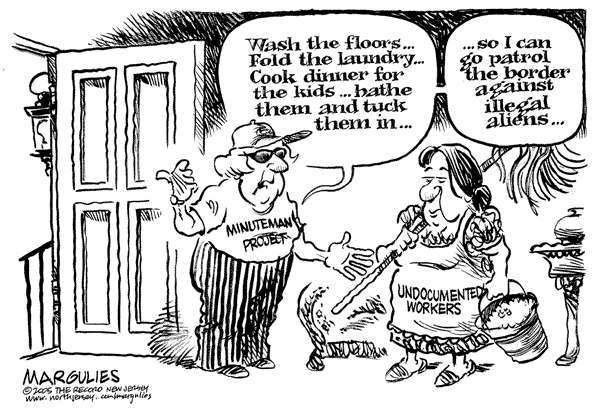|
April 10, 2006
Back to Mario Tronti's Strategy of Refusal that I considered in this post, and which was part of a successful symposiumat Long Sunday. In this post I want to connect some remarks Tronti makes about the working class and the people to transnational migration and the nation state.
The historical backdrop is the White Australia policy in 1900, but it has become a political issue in the US today as the United States is seen to "under siege" by "hordes of illegal aliens":

Jimmy Margulies
In his Strategy of Refusal text Tronti says:
Of course, the working class is not the people. But the working class comes from the people. And this is the elementary reason why anyone --- like ourselves ---who take up the working class viewpoint, no longer need to "go towards the people". We ourselves, in fact, come from the people. And just as the working class frees itself politically from the people at the moment when it is no longer posed as a subaltern class, so too working class science breaks with the heritage of bourgeois culture at the moment that it no longer takes the viewpoint of society as a whole, but of that part which wishes to overthrow society. Culture in fact, like the concept of Right, of which Marx speaks, is always bourgeois. In other words, it is always a relation between intellectuals and society, between intellectuals and the people, between intellectuals and class; in this way it is always a mediation of conflicts and Their resolution in something else. If culture is the reconstruction of the totality of man, the search for his humanity in the world, a vocation to keep united that which is divided ----then it is something which is by nature reactionary and should be treated as such. The concept of working class culture as revolutionary culture is as contradictory as the concept of bourgeois revolution. Furthermore, the idea implies that wretched Counter-revolutionary thesis whereby the working class is supposed to re-live the whole experience of the history of the bourgeoisie. The myth that the bourgeoisie had a "progressive" culture, which the working class movement is then supposed to pick up out of the dust where capital has thrown it (along with all its old banners), has carried Marxist theoretical research into the realm of fantasy.
The people imply a nation whilst class and capitalism implies state. So Tronti's assumes the nation-state as the boundary or horizon of his account, rather than the borderless world of the free trade cosmopolitans. For all hsi talk about being against economism, Tronti doesn't really explore the complexities marked by natonalism versus capitalism.
As the immigration issue in the US shows, the nation can be at odds with the economy, and this can lead to a contradiction in policy: closed border to protect the nation, open borders to allow low skilled Latin American labour to work for American companies. And you can have American workers patrolling the borders to keep out the illegal immigrations and prevent them from working in the low skilled jobs in the US for which there is a shortage of labour.
This citizen vigilantism, proudly protecting the "home front," is a different kind of refusal, is it not? It is in direct confrontation with a capitalist view of immigration flows of both cheap and skilled workers as being an unmitigated benefit for U.S. corporations and hence the U.S. economy.
Workers are not just workers. They are also Americans protecting America. This cultural nationalist perspective discloses the way the U.S. public generally views immigrants with more or less hostility according to the color of their skin, their English-speaking abilities, and the degree to which their religions and cultures depart from Judeo-Christianity. It is no longer the traditional working class antagonism that blames immigrants for job losses and declining wage levels.Today in the US, as Tom Barry points out:
Immigration restrictionism is increasingly framed as key to homeland and cultural protection. Most of the allied anti-immigrant forces argue that the War on Terror cannot be successfully fought without gaining total control of U.S. borders, downsizing the resident immigrant population, and severely restricting new immigration.
A cultural nationalism fused with securing borders and homeland security in the context of the free trade on North American continent is a very different world to that of Mario Tronti in Italy in the 1960s.
Does Tronti's text still speak to us in the present?
start
previous
next
|
